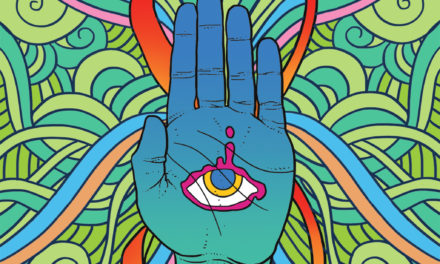As a child, I live in the shadow of a demanding, enigmatic father whose rules are always beyond me, a man I never seem to please. I am an extroverted kid, which delights my mother, because wherever she is in our rambling apartment, whatever she’s doing, she can hear me playing. That may charm her, but it’s only part of the story. For him, I am too loud and noisy, and he frequently calls me a wild animal (vildeh chayah in Yiddish). Unlike my more introverted older brother, I am mouthy and defiant, and so that means I have “a mouth like a garbage can.” I am also “stupid.” Though to be fair, this is one of my father’s favorite terms, so it’s not reserved for me alone. The world at large seems to be filled with stupid people who do stupid things.
He is obviously not stupid, but he does mysterious things.
My earliest memories of being in a car are my father requiring absolute silence when he turns the key in the ignition. For many years, I have a vague notion that engines cannot start if people in the car are noisy. And then my father rebukes almost every other driver on the road, so I learn that they are stupid, too. I dread being in a car alone with him. I don’t have any recollection of what he speaks about on these occasions, but I feel pinned under a microscope, trapped.
My father forbids taking a bath late at night. Not because it might possibly wake the neighbors in our Washington Heights apartment building. He doesn’t bother giving a reason for this ukase; he doesn’t have to. It’s just so, like everything else: he says that’s how it’s done and there’s no dispute: there’s only one way to do everything—his way.
Worst of all for my self-esteem is his constant hectoring about the way I walk. I have flat feet, I wear heavy metal arches in my shoes. As if that isn’t enough punishment, he shames me in public. Apparently I walk with my feet out too much, too much for him, that is, and I remember being on Broadway and him demonstrating how I should walk: feet straight ahead. That is the way he walks, and it is clearly the only way to walk. To this day, I cannot watch a movie and see someone walking with his feet splayed out and not think, “Well, he seems normal enough.”
And that’s not all: I’m too loud when I walk. Only years later do I learn from someone professionally analyzing my gait that I am a “heel striker,” inevitable given the condition of my feet.
It is as if my father has to not only suppress my childhood effervescence, but punish my body itself. This is doubly strange, given that he and my mother have sought to protect us as Jews by not having had my brother and me circumcised, because so many Jews were caught by the Nazis with this witness to their faith. My parents’ fear is paradoxically inscribed on the flesh that they have left unmarked.
My father is emotionally abusive, or maybe corrosive is a better word. It is the psychological equivalent of foot binding, and nothing I do seems right. Years later, the first time I read the Gospel line “This is my beloved son in whom I am well pleased,” it makes me cry. And as a boy on the verge of adolescence, I sometimes cry when I am alone, lying on the floor and hugging our German Shepherd, who might not love me, but at least doesn’t draw away. How wonderful decades later to have a West Highland White Terrier so attuned to emotion that when I am in distress, he seeks me out, tries to climb on my lap, and gazes into my eyes with what is obviously sympathy and concern. And licks my nose.
Does my father ever hug me? I only remember him doing this as an adult, when he meets me at an airport and we exchange the sort of ceremonial hug fitting for two leaders of Communist countries.
When I finally read the Gospels for research in my mid-fifties, over and over I am struck with the obvious: the ways in which Jesus loves those who are left out, marginalized, shunned and unloved. It is what David Nantais of Mercy College says: “Those who approached Jesus desired to be acknowledged as possessing dignity. I believe Jesus fulfilled their desires by looking them in the eyes and gently speaking simple words that we all hope to hear: that we are beloved, that someone sees and affirms our beauty, and that we do not have to face our fears alone.”

My father certainly has his fears when I am very young. I hear his nightmares two rooms away. He moans, an eerie, wordless cry while my mother shakes him trying to wake him up, saying over and over it’s only a dream. All I know then is that the dreams are about “The War,” and in my household, that means the Holocaust. And I know that he has shrapnel in his body, but I have never seen any scars. So this man who relives horrific brutality inflicts a lesser measure on me, because I do not meet his standards that are as high and vigilant as satellites. His own father served in the Hungarian army in World War I and was a Russian POW—what brutality did he survive and pass on in altered form?
But I am resilient enough to not be crushed by my father because I have a secret weapon: my mother loves me. And as Freud says, “A man who has been the indisputable favorite of his mother keeps for life the feeling of a conqueror, that confidence of success that often induces real success.” This is what protects me from him without my being able to name it or recognize it, and it emerges as early as second grade when I know I want to be a story teller, the kind whose words end up in a book. I am going to be a success; I am going to be a writer.
I am in love with books, not just for their tales, but the books themselves. In a time before Legos, I love stacking them, and more than playing with blocks, I turn books into little castles, standing them up on end and marching little toys or Disney figures across the tops. I take refuge in books. They save me, they give me hope, and they show me a path.
I am wild about two specific books, Cheaper by the Dozen and The Three Musketeers.
The first dates to 1948 and I am reading it less than ten years afterwards. It’s the story of a remarkable man, Frank Gilbreth, the nation’s first time-motion expert whose obsession with industrial efficiency shapes how he raises his twelve children. Told by two of them as adults, the memoir is hilarious and touching. I read the book so many times the binding cracks and frays. He is a demanding father, but the love of life and the love he has for his children shines from every page. I long to be one of his children, lost in a glorious crowd.
But I also long to be D’Artagnan. He is mocked from the beginning of the novel, which is studded with father figures of all kinds, and he triumphs in the end. It is for me a fantasy of redemption from suffering, though I am too young to use those words or formulate the concept. All I know is that the book compels me, hypnotizes me, and some of my fondest memories of early childhood are being curled up on my single bed, on my right side, reading, lost, and free. The room is filled with northern light and I could be in a tower room of some impregnable castle on our hill. I love to read as dusk comes on until I can see the lights of the George Washington Bridge. They seem full of promise. I don’t know for what, though, because I don’t have my own words yet, I just have longing that is deep, abiding, and perhaps unquenchable.







